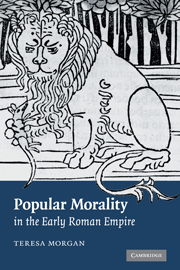Book contents
- Frontmatter
- Contents
- Preface
- List of illustrations
- List of tables
- List of abbreviations
- 1 Introduction
- PART ONE
- PART TWO
- PART THREE
- 10 The importance of being miscellaneous
- 11 Popular morality and high philosophy
- 12 Morality inter alia
- Conclusion
- Appendix 1 The political and literary connections of Babrius
- Appendix 2 The definition of a miscellany
- Appendix 3 Popular morality and philosophical doctrine
- List of papyri
- Bibliography
- Index
12 - Morality inter alia
Published online by Cambridge University Press: 27 October 2009
- Frontmatter
- Contents
- Preface
- List of illustrations
- List of tables
- List of abbreviations
- 1 Introduction
- PART ONE
- PART TWO
- PART THREE
- 10 The importance of being miscellaneous
- 11 Popular morality and high philosophy
- 12 Morality inter alia
- Conclusion
- Appendix 1 The political and literary connections of Babrius
- Appendix 2 The definition of a miscellany
- Appendix 3 Popular morality and philosophical doctrine
- List of papyri
- Bibliography
- Index
Summary
Walk on in good heart.
From philosophy, we turn finally to evidence for popular morality in two very different genres, documents on papyrus and on stone. This chapter has a certain miscellaneous quality of its own, but I hope to a purpose. It aims to sketch, through examples and case studies, how the material we have been examining compares with the moral language of a number of other widely shared discourses from the early Empire.
One of the attractions of documents is that some, at least, of them come from a lower social level than the great majority of our literary survivals. Most (virtually all papyri) are provincial, and originate outside large urban centres. Many deal with the mundane activities of relatively ordinary people: craftsmen, farmers, traders, soldiers, local magistrates. Whole social groups, notably women, freedmen and members of ethnic minorities, who in literature are overlooked or marginalized, come into their own in papyri and inscriptions, and are revealed as active, often influential members of their communities.
Unfortunately for our purposes, the social distribution of documents which are long and complex enough to deploy ethical language and ideas, does not match that of documents in general. Funerary inscriptions, for instance, which list the virtues of the deceased are nearly always among the longer and more elaborate productions, often composed in verse or illustrated with a relief, which tells us that the family concerned was relatively wealthy.
- Type
- Chapter
- Information
- Popular Morality in the Early Roman Empire , pp. 300 - 323Publisher: Cambridge University PressPrint publication year: 2007



